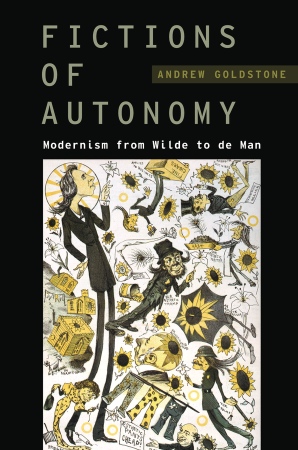
Oxford University Press, January 2013
Modernist Literature & Culture Series
Order from OUP or amazon or Powell’s
Available on Oxford Scholarship Online
No aspect of modernist literature has attracted more passionate defenses, or more furious denunciations, than its affinity for the idea of autonomy. A belief in art as a law unto itself is central to the work of many writers from the late nineteenth century to the present. But is this belief just a way of denying art’s social contexts, its roots in the lives of its creators, its political and ethical obligations?
Fictions of Autonomy argues that the concept of autonomy is, on the contrary, essential for understanding modernism historically. Disputing the prevailing skepticism about autonomy, Andrew Goldstone shows that the pursuit of relative independence within society is modernism’s distinctive way of relating to its contexts. Modernist autonomy is grounded in connections to servants and audiences, aging bodies and wardrobe choices; it joins T.S. Eliot to Adorno as exponents of late style and Djuna Barnes to Joyce as anti-communal cosmopolitans. Autonomy reveals new affinities across an expansive modernist field from Henry James and Proust to Stevens and de Man. Drawing on Bourdieu’s sociology, formalist reading, and historical contextualization, this book shows autonomy’s range—and its limitations—as a modernist mode of social practice.
Nothing less than an argument for a wholesale revision of the assumptions of modernist studies, Fictions of Autonomy is also an intervention in literary theory. This book shows why anyone interested in literary history, the sociology of culture, and aesthetics needs to take account of the social, stylistic, and political significance of the problem, and the potential, of autonomy.
On Fictions of Autonomy
“In this wonderfully surprising and original study, Andrew Goldstone recovers a consistent recourse in modernism to ‘fictions of autonomy,’ designed precisely to mediate relations between works of art and the social and political domains. Goldstone’s procedure is not to rehearse all the old arguments for and against autonomy but to show us how the relative autonomy of art was experienced and figured in a broad range of works. The result is a rich new history of modernism, from which the concept of autonomy emerges as an abstraction blooded rather than bloodied.”
—John Guillory, author of Cultural Capital: The Problem of Literary Canon Formation“Fictions of Autonomy develops a fresh and interesting argument about four different facets of aesthetic autonomy, fleshed out through reference to a wide range of literary and theoretical texts. The book is always a pleasure to read, and the pairings of texts in individual chapters are persuasively accomplished.”
—Rita Felski, author of Uses of Literature“In recent decades—even despite the affirmative renaissance of modernist studies since the 1990s—‘autonomy’ has not seemed a redeemable idea; indeed it has seemed only an idea to demystify and dismiss. Fictions of Autonomy asks that we approach the concept with more intelligence; and it models that intelligence with no little brilliance and with remarkable ingenuity.”
—Robert L. Caserio, editor of The Cambridge Companion to the Twentieth-Century English Novel
Fictions of Autonomy in digital form
As of May 2013, the book is available in the Oxford Scholarship Online database. Its stable URI is http://dx.doi.org/10.1093/acprof:oso/9780199861125.001.0001.
My blog posts about Fictions of Autonomy →
All the posts related to the book. Includes my January 2013 remarks on the book to the Comparative Modernisms Workshop at Northwestern University.
Technical note →
I describe the software used to produce Fictions of Autonomy in this technical note.
Errata →
Corrections to the printed text of Fictions of Autonomy.
